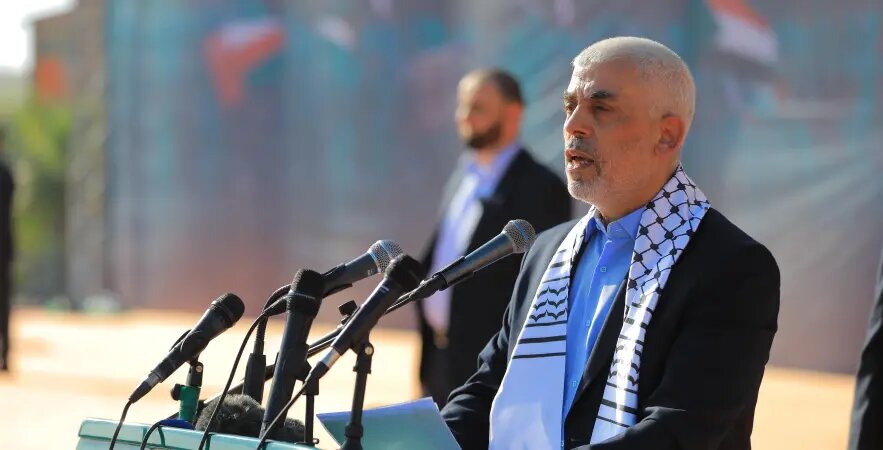He was arrested in 1988 and sentenced to four life sentences, before being released under a major deal in 2011.
Hamas has named its top official in Gaza, Yahya Sinwar, as its new political chief after Israel assassinated Ismail Haniyeh alongside his companion, Wasim Abu Shaaban, in Tehran last week.
The Palestinian movement announced the selection of Sinwar on Tuesday following internal discussions and consultations.
Israel considers Sinwar as the mastermind behind the surprise October 7 attack, where Hamas armed wing, the Al-Qassam Brigades, infiltrated occupied territories and returned with about 240 Israeli captives.
Israel has since attempted to assassinate Sinwar alongside top military commander Mohammed Deif. Last week, the Israeli military alleged that it killed Deif, but it was later denied by Hamas.
Analysts believe the appointment of Sinwar is aimed at sending a clear message to Israel that Gaza “is the one that calls the shots”.
“I think the decision by Hamas to appoint Sinwar as a successor to Haniyeh, at least in the interim period until an election is held, is meant to send a message to the Israelis and their supporters that if you didn’t like Haniyeh, you have now to contend with Sinwar,” Dr. Azzam Tamimi, Palestinian author, told Doha News on Wednesday.
“The other significance is that Gaza today is the one that calls the shots,” he explained.
Analysts had speculated that Hamas would name one of its members abroad, including Haniyeh’s predecessor Khaled Mashal, senior Hamas official Mousa Abu Marzook, or Deputy Head of Hamas’s Political Bureau in the Gaza Strip, Khalil Al-Hayya.
“It’s interesting to know that Khaled Mashal, who was the favourite in many people’s eyes, was the one who insisted on Sinwar’s appointment. This also serves to dispel any illusion about a division inside the movement,” Dr. Tamimi noted, adding that the war has united Hamas “like never before”.
Who is Yahya Sinwar?
Sinwar was born on October 19, 1962 in the Khan Younis refugee camp on the south of the Gaza Strip, after his family were forcibly displaced by Israel from Ashkelon, originally known as Al-Majdal, during the Nakba or “catastrophe” in 1948.
At the time, Zionist militia forcibly displaced and killed Palestinians to establish Israel.
Sinwar grew up under difficult conditions and witnessed Israel’s repeated attacks and harassment of Palestinians in the camp. He then studied at the Islamic University of Gaza, where he obtained a bachelor’s degree in Arabic language studies.
Sinwar became more involved in politics in the 1980’s and helped establish a security apparatus called the “Jihad and Preaching Organisation”, also known as “Majd”, that aimed at capturing Israeli spies and agents.
Israeli occupation forces first arrested Sinwar in 1982 at the age of 20 for his involvement in Palestinian resistance for six months, before being arrested for the second time in 1985 for eight months.
He was arrested again in 1988 and sentenced to four life sentences, though he only served 23 years in Israeli prisons, including four years in solitary confinement.
During Sinwar’s imprisonment, he led the supreme leadership body of Hamas’s prisoners. He also led a series of hunger strikes, including in 1992, 1996, 2000 and 2004. Palestinian prisoners often go on hunger strikes in protest of their imprisonment.
Sinwar became fluent in Hebrew during his imprisonment and authored many political and security books with translations.
In 2011, Sinwar was released under the major “Loyalty of the Free” deal, which led to the release of 1,027 Palestinian prisoners, who were mostly serving long prison sentences, in exchange for Israeli soldier Gilad Shalit.
Sinwar had played a crucial role in laying out the deal’s terms and conditions.
His house was bombed and destroyed in 1989, a second time during the 2014 Israeli aggression on the Gaza Strip, a third time during the 2021 aggression, and a fourth time during the ongoing genocidal war in the besieged enclave in 2023.
Like other Hamas officials, the United States added Sinwar to its black list of “international terrorists” in 2015.
Sinwar was elected as Hamas’s chief in the Gaza Strip in 2017 then again in 2021.
While Sinwar has not appeared in public since the beginning of the war in the Gaza Strip, media reports claimed he met some of the Israeli captives held in Gaza, last November. According to the reports, Sinwar assured them in “flawless Hebrew” that they were at their “safest” place in captivity.







